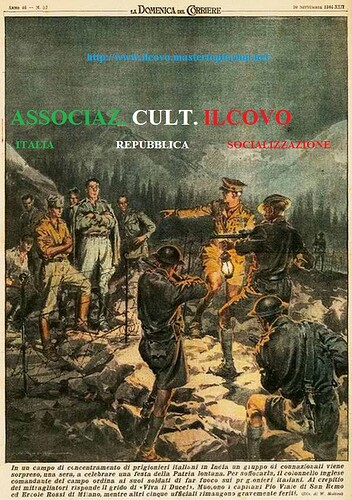“Minor” war crime perhaps, because the victims are a limited number, but a crime is and remains a crime.
Yol, India, spring 1942. In the prison Camp n. 25 there are no news. The Italian prisoners day-time life proceeds as usual. But today, april 21st, it’s not an usual day. It’s the anniversary of the birth of the Eternal City, Rome, the Capital of Italy, her 2695th birthday. In the far Fatherland, it’s a National Celebration day (during the fascism it was).
Two officers, captain Pio Viale from Sanremo (Genoa) and captain Ercole Sante Rossi from Secugnago (Milan) lead the other prisoners in celebrating the Day with patriotic songs on theme, like the “Inno a Roma” with music composed by Giacomo Puccini and inspired to “Carmen Saeculare” of Horace.
Rapidly all the prisoners start to sing and a roar of Italian patriotic songs expands all over the Camp n. 25, and from the n. 25 to the others. All the about 10000 prisoners of Yol are now singing and no shauting or whistles of the guards can stop them.
The commander of the camp, col. A. H. Wilson, runs towards Viale and Rossi. He orders to shut up, and menaces to order opening fire on the prisoners.
The Italian officers respond that he can’t impede the prisoners singing, or celebrating, and add: “Viva il Duce!”
Col. Wilson, coldly, holding a smg fires and orders to sergeant Beatson to fire too: the two Italian officers are instantly and unscrupolously killed, five other prisoners seriously wounded.
Now the patriotic songs are suddenly switched off by small air arms noices, the human rights are suddenly switched off by overpowering and blood.
Anyway the prisoners, after this latest brutal violence, can’t leave the memory of their comrades without revenge, can’ t leave this crime unpunished.
Of course just symbolic revenge, symbolic punishment, it will be sufficient and there must be no pretext for other crimes.
Leutnant Marino Bolla, in the civilian life an university literature student, and in the camp life assigned to some works in the British officers mess, gets an idea. The comrades were killed for their celebrating of the Birth of Rome… well, the retaliation will be in Latin.
With an escamotage he poses a written over every place in the British officers mess: “Memento Universi Romano Detestatio Exterminatio Ruinaque Supremae”. Perhaps not all the British officers of Yol know the Latin (and for those which know it the mockery meaning for the recipients should be quite clear), but the written is drawn in such a way that all understand the acronym: M.U.R.D.E.R.S.
The memory of Viale and Rossi was awarded by the Italian Gold Medal, the equivalent of the British Victoria Cross.
There, now that is something you don’t get to read everyday (on ww2 fora which are dominated by anglophiles).
Thanks for posting.
But to support this a little bit more; do you have extra web links ? googling the names didn’t get me anything.

